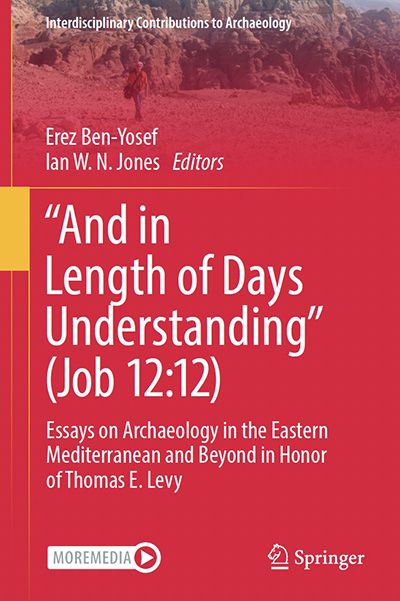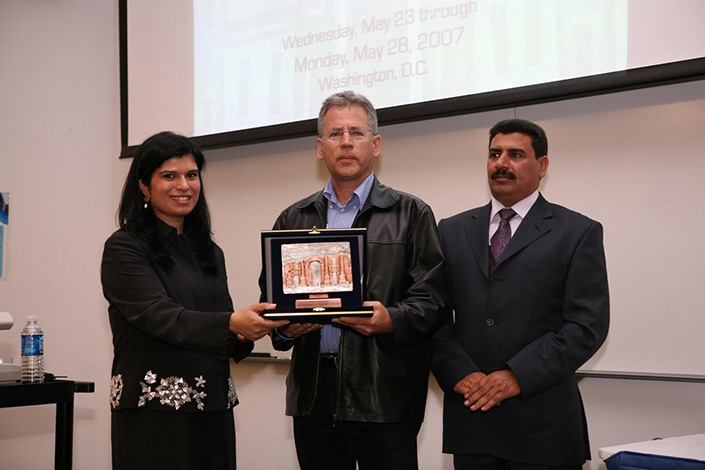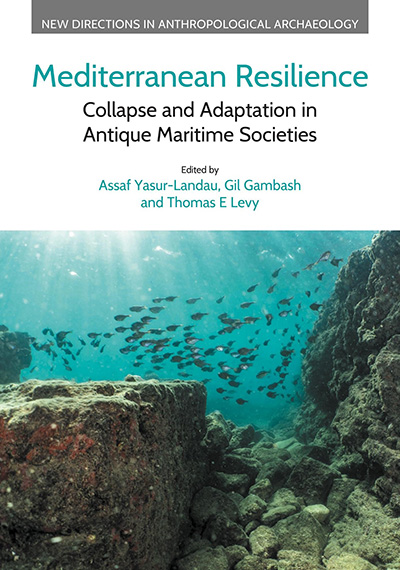Book Honors Archaeologist’s Storied Career
Story by:
Published Date
Article Content
Ask what sets Thomas Levy apart, and you’ll hear stories about curiosity, connection, and an enthusiasm for collaborating with people across very real boundaries.
Since his start in archaeology as a teenager in the late 1960s, Levy has pioneered new sub-disciplines in his field, helped shape dozens of mentees’ careers and even challenged our understanding of the rise and fall of ancient civilizations.

A comprehensive book or “Festschrift,” German for “celebration writing,” features new research published in Levy’s honor by more than 140 friends and colleagues. Titled “‘And in Length of Days Understanding’ (Job 12:12): Essays on Archaeology in the Eastern Mediterranean and Beyond in Honor of Thomas E. Levy” and published with Springer late last year in two peer-reviewed volumes, the book marks Levy’s retirement as the inaugural holder of the Norma Kershaw Chair in the Archaeology of Ancient Israel and Neighboring Lands and a distinguished professor with the UC San Diego Department of Anthropology and Jewish Studies Program, as well as his ongoing contributions to Eastern Mediterranean archaeology.
“[The Festschrift] means a lot to me as validation of having been a professor for so many years, and of having worked so closely with my graduate students,” said Levy, who continues to co-direct the Center for Cyber-Archaeology and Sustainability (CCAS) at the UC San Diego Qualcomm Institute (QI) and who has become a distinguished professor in the university’s Graduate Division. “Many of the [contributors] are quite well-known in their fields. To see them write something in my honor is very touching.”
Shaping a field
Festschrifts represent a mark of distinction in academic circles. This one, spearheaded by two of Levy’s former doctoral students, Erez Ben-Yosef and Ian W. N. Jones, now at Tel Aviv University and New York University respectively, represents a significant contribution of new research to topics Levy has studied and helped develop for years.
“We wanted to create something that reflected the community of scholars Tom has built around himself,” said Jones. “He bridged a lot of gaps. He could befriend people and scholars he disagreed with. I think the Festschrift reflects that.”
The book’s 82 chapters introduce findings in specialties such as the pre-literate civilizations of the Southern Levant, a region that encompasses modern-day Israel, the Palestinian territories, Jordan, Lebanon, southern Syria and the Sinai desert; ancient metal-working and production; underwater archaeology and the sub-discipline “cyber-archaeology,” which incorporates computer science and engineering in archaeological digs.
While both Ben-Yosef and Jones said they expected an enthusiastic response to their call for contributions, neither of them could have predicted its full scope.
“Even knowing how connected Tom was, we were surprised by how many people wanted to contribute,” said Ben-Yosef.
Levy came of age in Los Angeles, California, with a love of Jewish culture that grew in parallel with his fascination with archaeology.
As an archaeologist, Levy’s research focused on the development of civilizations from the Neolithic period more than 12,000 years ago to the early Iron Age around 3,000 years ago, and the archaeology of the Hebrew Bible. His UC San Diego Levantine and Cyber-Archaeology Lab used radiocarbon dating, statistical modeling and digital mapping to revisit major dates in Levantine history, tracing long-ago shifts in power through patterns of mining and metalworking.
Levy was also responsible for launching and defining the sub-field of cyber-archaeology in the late 1990s with QI as his base. As political sensitivities in the region intensified, Levy and his team shifted to a purely digital approach to recording and mapping their dig sites. Even without on-site access, they could review their progress through photos, digital models and other virtual records.
Levy’s groundbreaking work has earned him significant recognition, including election to the American Academy of Arts and Sciences and an honorary doctorate from Charles University in the Czech Republic. In 2007, he received a trophy for his role as lead editor on a book on North American contributions to the archaeology of Jordan, where he has conducted research with friend and colleague Mohammad Najjar, formerly the Director of Excavations and Surveys with the country’s Department of Antiquities, since 1997. The trophy was presented by the late Fawwaz al-Khraysheh, the department’s Director General, and Her Royal Highness Princess Sumaya bint El Hassan, princess of Jordan. Levy calls it “one of the most touching tributes” he has received.

A collaborative journey
As a professor and Ph.D. advisor with the UC San Diego Department of Anthropology, Levy ensured that his graduate students had chances to gain valuable field experience. Jones, who began his doctoral studies with limited background on digs, said Levy’s impact on his career was “huge.”
“[Levy] shares his knowledge, data, expertise and infrastructure with an open-door approach, which has made him very engaged in different circles,” added Ben-Yosef.
In 2005, Levy joined QI, then known as the San Diego division of the California Institute for Information Technology and Telecommunications (Calit2), where he worked alongside Calit2 Founding Director Larry Smarr, QI Director Ramesh Rao, QI Research Scientist Thomas DeFanti and other leaders in advancing the technology behind data-intensive fields like cyber-archaeology.
“Something I learned at the Qualcomm Institute was to be even more collaborative, and to be what people call ‘transdisciplinary,’” said Levy, referring to an approach that pulls together expertise from different disciplines. “Transdisciplinary research has been a very important part of my work since the beginning.”
Levy has received multiple awards to fund transdisciplinary research for the study and preservation of cultural heritage in the Eastern Mediterranean. Those awards include the 2016 University of California President’s Research Award, which supported a multi-campus effort to identify and digitally preserve endangered heritage sites in the Middle East for history and outreach.
That same year, Levy began a series of underwater cultural heritage projects in Greece. Collaborating with professors Ioannis Liritzis of the University of the Aegean and George Papatheodorou of the University of Patras abroad, Levy carried out paleoenvironmental and underwater cyber-archaeology studies with Richard Norris of the UC San Diego’s Scripps Institution of Oceanography.
Starting in 2017, following a growing collaboration with the University of Haifa in Israel, Levy completely shifted his focus from the desert to the coast. Diving along Israel’s Carmel shoreline, he and his fellow researchers studied underwater ruins dating back more than 10,000 years to track human adaptation to climate change and rising seas.
In 2020, the UC San Diego Scripps Center for Marine Archaeology, which Levy co-directed at the time with Scripps Oceanography’s John Hildebrand, and University of Haifa’s Leon Recanati Institute for Maritime Studies received more than $1.3 million from the Koret Foundation to fund marine archaeological research on Israel’s coast. The funding supported three years of research into ancient civilizations’ response to climate and environmental change.

This February, Equinox Publishing released a new book called “Mediterranean Resilience: Collapse and Adaptation in Antique Maritime Societies,” edited by Levy and University of Haifa colleagues Assaf Yasur-Landau and Gil Gambash. The book details ancient Eastern Mediterranean communities’ adaptations to rising seas and changing environmental regimes on the coast.
Although he has retired from teaching, Levy says looks forward to continued research with his colleagues at UC San Diego and overseas.
Of the Festschrift, Ben-Yosef noted, “I wanted [Levy] not to just know, but to feel—to have evidence—of the appreciation and community that he has in archaeology. The Festschrift is] a testimony to his achievements and a reflection of his career. It’s a big move for a researcher to move from professorship to pure research. We wish him a long and productive continuation of his scholarship career.”
For more information on Levy, see his biography on the QI website.
Share This:
You May Also Like
Stay in the Know
Keep up with all the latest from UC San Diego. Subscribe to the newsletter today.



